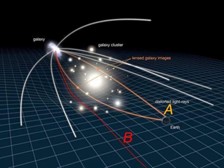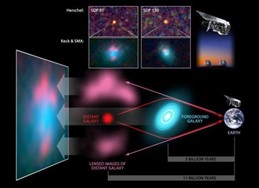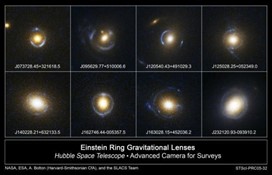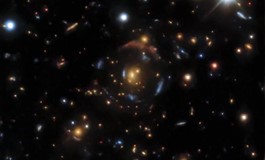Gravitational Lensing

The “elegance” of the Universe is manifested day by day through its numerous intriguing phenomena beyond human imagination and gravitational lensing is one such grandeur. Gravitational lensing was initially predicted by Albert Einstein in his theory of general relativity where the fabric of the space-time continuum is distorted by the presence of a massive object creating a strong gravitational field that in turn distorts and magnifies the light from background galaxies on the same line of sight from the observer’s perspective.

Among the factors which cause gravitational lensing, the foremost would be the presence of matter concentrated at a certain position, an individual star for instance, the light is redirected around the core of the object and forms multiple images around the lensing mass. When a perfect symmetry is achieved in such an instance, it results in a ring shape around the lens alias The Einstein’s Ring. In addition, gravitational lensing may occur due to the presence of high matter density in galactic clusters, which is asymmetric unlike the former, and further results in background galaxies appearing as thin lensed arcs on the cluster outskirts. A special case would be the process where distant background stars are magnified due to the gravitation of massive stars in the foreground. Consequently, these distant stars may appear brighter temporarily for days or even weeks! This phenomenon is termed as gravitational microlensing.

Beyond its spectacle, gravitational lensing is a theme of utmost importance among the astrophysics community. Gravitational lensing enables researchers to map out the matter distribution in galaxy clusters : both visible and dark. Further, these lenses act as natural telescopes for the Hubble Space Telescope, facilitating the study of distant galaxies, thereby widening our scope of the Universe!

References - https://hubblesite.org/contents/articles/gravitational-lensing https://frontierfields.org/ https://www.science.org.au/curious/space-time/gravitational-lensing
